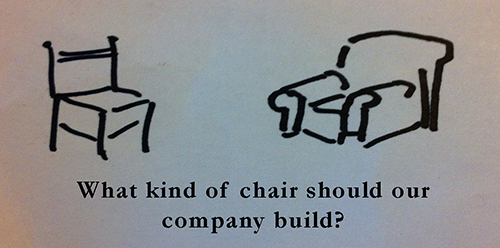Meetings don’t have to be bad. They are where you get together with your crew and figure out how to make your company awesome. When I moved from maker to manager, I discovered meetings is where I get things done. I needed to master them, or they would master me. Here are five tricks I’ve discovered from my long painful life of meetings
- Stop oversharing. Status meetings are the meetings most people think about when they say they hate meetings. Imagine if a status meeting wasn’t about showing off, and it was actually about getting things done as a team. Instead of listing every single thingyou did next week to show everyone how gosh-darn hard you work, just list your top three priorities. Tell people what will affect them. Ask for any help you need. That’s it.
As a pleasant side effect, these meetings will actually start ending on time. - There is no meeting that is productive after two hours. This was something that everyone said when I worked at LinkedIn, and I have found it to be true over and over again. People get fried.
As well, the recovery period from a difficult meeting (e.g. areorg or planning a new product) is at least as long as the time the meeting took. Taking a long break between meetings also allows you to contemplate whatwas said, do a little research, and check assumptions with team members. Therefore, when doing important group activities, expect to do them only daily, or if it’s urgent, twice daily. Ideally, 10 and 2.Next time you are planning a all day offsite, consider setting aside a week of mornings instead.
You’ll make better decisions. - Stop interrupting your team’s flow to meet. People who make things need large blocks of time to do good work. This is best explained by Paul Graham in Marker’s Schedule, Manager’s schedule. Make meetings with engineers and designers either always in the morning or always in the afternoon, but never both. And be consistent, makers need time to mentally prepareto be creative. If you spring a meeting on them, it will throw them off.
Try to commit to one day a week meeting-free. - If your conversation has stalled, or people aren’t understanding you, get up and draw. It’s said a picture is worth a thousand words (by Dan Roam,Sunni Brown, Dave Grey and many others), yet over and over we sit around a table trying to describe something that would be clearer if drawn. For example,why do we try to describe with words a screen layout or a process flow? Maybe it’s fun as a writing exercise to describe something visual with words, but just annoying in practice. When you say the word “chair” everyone pictures something different.
Even a bad drawing brings clarity.
Plus, standing up is good for your back. Win-win. - Always send out decisions immediately after a meeting. Everything is clear after a meeting. Everything is muddy three hours later. Even if you don’t want to keep extensive notes (and certainly no one wants to read them) send out a short note that says “we discussed this, we decided that, and we still have to solve this other thing.”
Plus, it gives everyone a chance to tell you that you got it wrong if you did, and something to reference later if they forget you were right.
Finally, Suck it up and do good meeting hygiene. Send out an agenda. Write it on the blackboard. Set up the meeting in the beginning by reminding people why they are there. Put off-topic issues in a parking lot. End on time. If it’s not ending on time, don’t try to jam the rest of the agenda into the last few minutes, just schedule a follow up meeting! These are best practices for a reason: they keep people from hating you.
Stop thinking of meetings where work gets interrupted, and think of them where work gets done. Don’t put up with long rambling meetings. Enforce the parking lot, remind people why they are there, ask opinions from people who have checked out and are reading email… in other words, take control of your meetings.